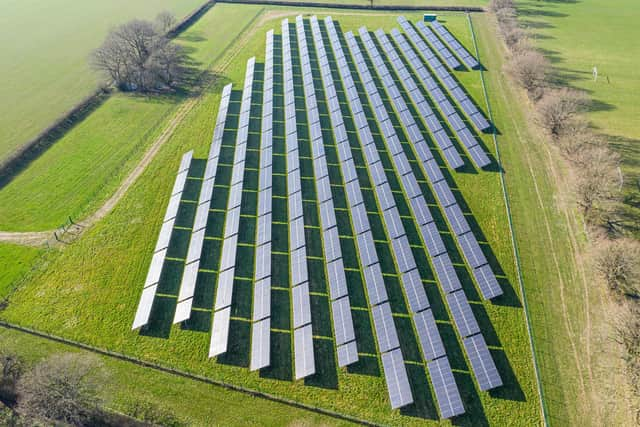Renewable energy: solar panel farms in space could provide an abundance supply of clean energy
and live on Freeview channel 276
Solar farms in space could provide us with an abundance of clean energy as scientists say they have proven these farms are possible after following a satellite in orbit for six years. A team from the University of Surrey and the University of Swansea followed the orbit to look at how the panels generated power, weathered solar radiation and tolerated space's harsh conditions.
The evidence was gathered over 30,000 orbits, and although the cell's power output deteriorated over time, the researchers believe their findings prove solar-powered satellites could work and be commercially viable.
Advertisement
Hide AdAdvertisement
Hide AdThe satellite was designed by Surrey Space Centre along with a team of trainee engineers from the Algerian Space Agency, who made the cells out of thin-film cadmium telluride, which acts as a semiconducting material, laid on ultra-thin glass. The new solar technology allows for larger, lightweight panels which generate more power and are relatively low-cost.


Professor Craig Underwood, Emeritus Professor of Spacecraft Engineering, at the University of Surrey said: "We are very pleased that a mission designed to last one year is still working after six. These detailed data show the panels have resisted radiation and their thin-film structure has not deteriorated in the harsh thermal and vacuum conditions of space.
"This ultra-low mass solar cell technology could lead to large, low-cost solar power stations deployed in space, bringing clean energy back to Earth – and now we have the first evidence that the technology works reliably in orbit."
Although more research is needed, researchers say “this flight has proven the basic soundness of the technology for use in space”.
Advertisement
Hide AdAdvertisement
Hide AdSolar panels in space could provide an endless amount of energy, as there are no clouds and no atmosphere in space to affect the input of energy. This means satellite-based solar panels could be far more effective at capturing and transmitting energy than renewable infrastructure on Earth.
Dr Dan Lamb, University of Swansea said: "The successful flight test of this novel thin film solar cell payload has leveraged funding opportunities to further develop this technology.
"Large area solar arrays for space applications are a rapidly expanding market and demonstrations such as this help to build on the UK’s world class reputations for space technology."
The study has been published in the journal Acta Astronautica.
Comment Guidelines
National World encourages reader discussion on our stories. User feedback, insights and back-and-forth exchanges add a rich layer of context to reporting. Please review our Community Guidelines before commenting.
